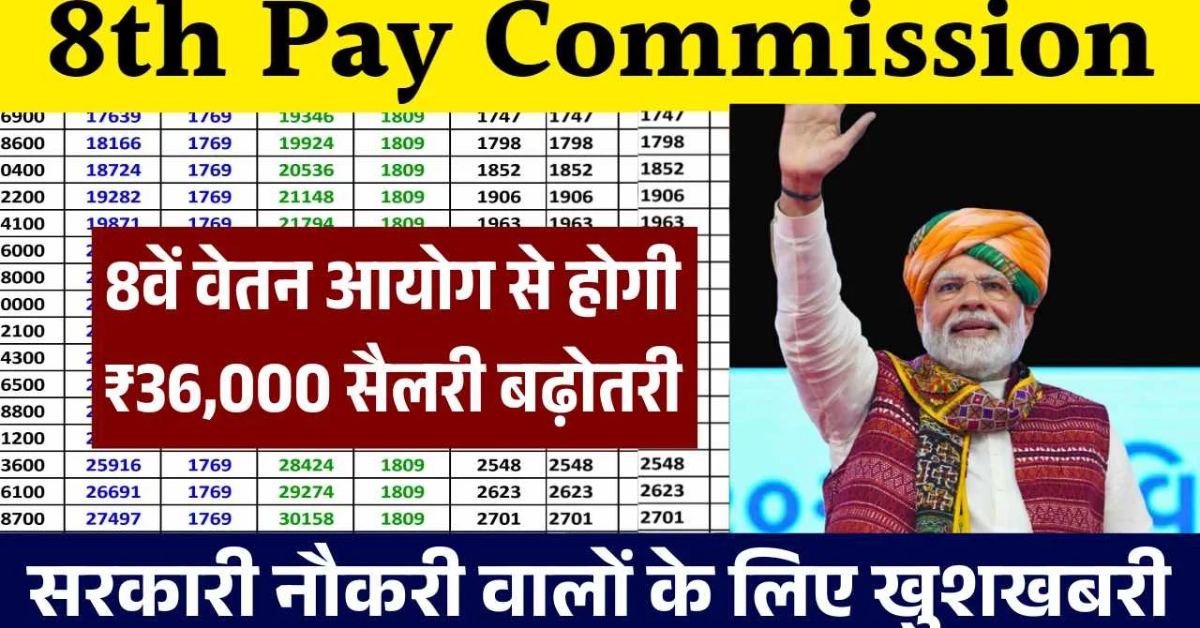Government employees in India may soon receive good news regarding their salaries. According to ongoing discussions and speculations, the 8th Pay Commission could be introduced by the central government by 2025, leading to a massive increase in salaries — with hikes expected up to ₹36,000 per month in some cases.
With the cost of living rising and inflation affecting day-to-day expenses, the announcement of a new Pay Commission is always met with great anticipation. If implemented, this commission would follow the 7th Pay Commission, which was rolled out in 2016.
In this article, we will explore everything you need to know about the 8th Pay Commission: what it is, when it may be implemented, how much salary may increase, and who all will benefit.
📜 What is the Pay Commission?
A Pay Commission is a body set up by the Government of India every few years to review and revise the salary structure of central government employees and pensioners. It evaluates:
- Basic pay
- Allowances (DA, HRA, TA, etc.)
- Pension benefits
- Gratuity and retirement rules
Each commission typically results in significant improvements in compensation, aligned with the economy and inflation.
📅 When Can We Expect the 8th Pay Commission?
- The 7th Pay Commission was implemented in January 2016, and its recommendations are still in effect.
- Based on historical trends, the next pay revision is likely in 2026.
- However, discussions have intensified in 2024–25, and experts suggest that the 8th Pay Commission could be announced in 2025, giving the government a chance to implement it before the 2026 general elections.
📈 How Much Salary Increase Can Employees Expect?
According to reports, if the 8th Pay Commission is implemented:
- Basic salary may see a rise of 20% to 35%.
- Monthly gross salary increase could range between ₹8,000 and ₹36,000, depending on the employee’s level and grade pay.
- Pensioners could also see a considerable hike in their monthly pensions.
🧾 Example Salary Impact:
| Employee Type | Current Gross Salary | Expected Hike (%) | Estimated New Salary |
|---|---|---|---|
| Entry-level Clerk | ₹28,000 | 30% | ₹36,400 |
| Junior Engineer | ₹42,000 | 25% | ₹52,500 |
| Senior Officer | ₹75,000 | 30% | ₹97,500 |
| Group A Officer | ₹1,25,000 | 28% | ₹1,60,000+ |
Note: Exact figures may vary based on grade, location, and allowances.
👥 Who Will Benefit from the 8th Pay Commission?
The commission’s recommendations will apply to:
- Central government employees (railways, defense, ministries, etc.)
- Pensioners and retirees
- Some PSU (Public Sector Unit) employees
- Likely extension to armed forces and paramilitary personnel
- May influence state governments to adopt similar pay revisions
Overall, more than 68 lakh employees and over 52 lakh pensioners could directly benefit.
💡 Key Features Expected in the 8th Pay Commission
Though nothing has been officially confirmed yet, based on expert predictions and employee demands, here’s what we can expect:
✅ 1. Higher Fitment Factor
The fitment factor is a multiplier used to calculate revised salaries. In the 7th Pay Commission, it was 2.57x.
In the 8th, employee unions are demanding it to be raised to 3.68x or more, which would significantly raise the basic pay.
✅ 2. Revised HRA (House Rent Allowance)
Employees working in metro cities or high-rent areas may see a 20–30% increase in HRA depending on their pay level and city classification.
✅ 3. Dearness Allowance (DA) Reset
The DA may be merged with basic pay, and a fresh cycle of DA increments (twice a year) may begin.
With rising inflation, DA hikes have been substantial in recent years.
✅ 4. Gratuity and Retirement Benefits
- Enhanced gratuity ceiling
- Revised pension calculation formula
- Possibly earlier retirement age or Voluntary Retirement Scheme (VRS) options with better benefits
📢 Why Are Government Employees Demanding the 8th Pay Commission?
Several factors are driving the demand:
- High inflation and rising expenses
- Salary gap with private sector widening
- 7th CPC no longer aligns with current economic conditions
- The last pay hike was nearly a decade ago
Employee unions like National Joint Council of Action (NJCA) have consistently requested the government to form the new commission and implement it before 2026.
🗳️ Is There a Political Angle?
Yes. With general elections approaching in 2026, the central government may consider this a vote-winning move. Implementing a salary hike in 2025 would boost employee morale and increase disposable income, benefiting the economy as well.
❓ FAQs About the 8th Pay Commission
Q1. Will the 8th Pay Commission be applicable to state government employees?
Not directly. However, many states adopt central pay commission recommendations for their own employees.
Q2. What is the fitment factor and how does it affect my salary?
The fitment factor is used to multiply your basic pay to get your revised salary. Higher the factor, bigger the hike.
Q3. When will it be officially announced?
As of now, there is no official date, but it is likely to be announced in 2025 and implemented in 2026.
Q4. Will pensioners benefit?
Yes. Pensioners usually get a revised basic pension and DA based on the new pay structure.
📊 Comparison: 7th vs 8th Pay Commission (Expected)
| Feature | 7th Pay Commission | 8th Pay Commission (Expected) |
|---|---|---|
| Implementation Year | 2016 | 2026 (likely) |
| Fitment Factor | 2.57x | 3.68x (demanded) |
| Average Hike | 23% | 25–35% |
| DA at Start | 0% | Likely reset to 0% |
| HRA Slabs | 24%, 16%, 8% | Revised to higher slabs |
🏁 Conclusion: A Positive Change for Government Employees
The potential announcement and implementation of the 8th Pay Commission could be a game-changer for central government employees and pensioners. With an expected salary hike of up to ₹36,000 per month, it will provide a much-needed financial cushion amid rising expenses.
While the government has not yet made any official declaration, the indications are strong, and discussions are underway. Government employees across departments are hopeful that the commission will be approved and implemented soon, restoring parity between inflation and income.
Stay tuned, prepare financially, and keep documents updated—you may soon benefit from the biggest salary hike in a decade.

